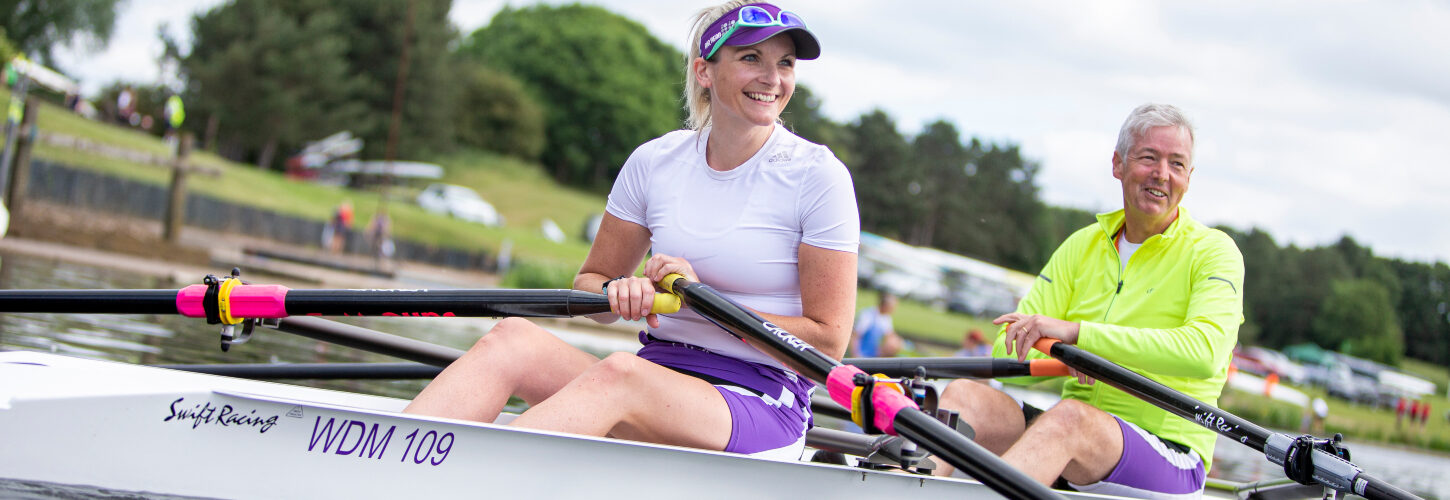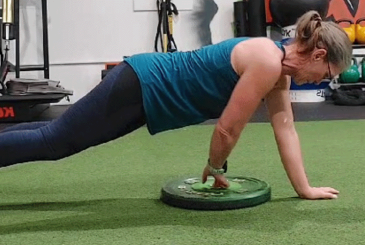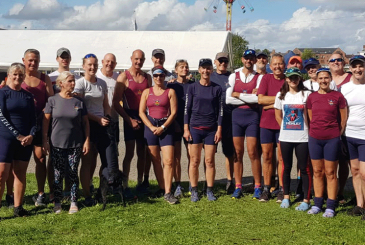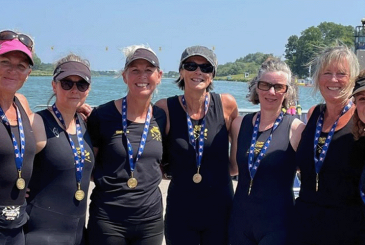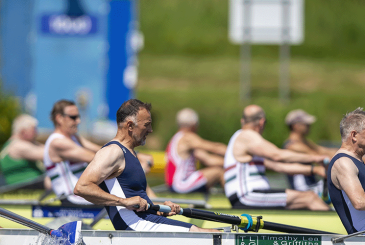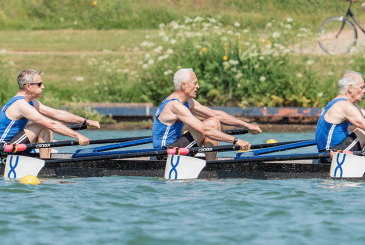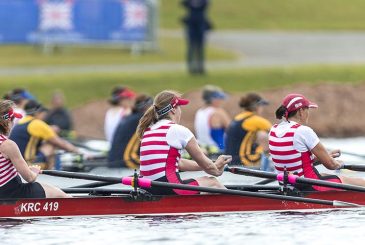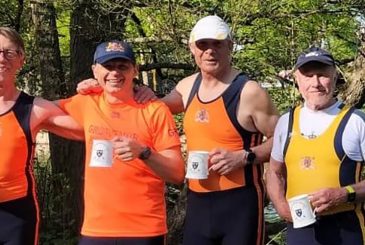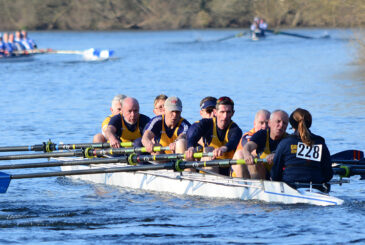Welcome to the first in British Rowing’s new feature series dedicated to masters rowers – delivered in partnership with Rosie Mayglothling
Rowing really is a sport for life and there are many clubs with thriving groups of master rowers up and down the country, inland and around the coast.
A leading figure in our sport, Rosie Mayglothling, has been instrumental in creating our first ever series specifically for the masters rower.
Rosie reflects: “As well as the long-term rower, there are many who come to it later in life and maybe rowing is their cross training.
“Most of us row in crew boats and as we get better, so does the feel in the boat. What many rowers love is that fantastic session when the crew harmony and effort make the boat flow. Effortless, yet everyone giving it their all. We remember those moments and continue to seek them out for the rest of our rowing careers, whatever level we row at.”
The former British Rowing Director of Pathway Development adds: “We row in such wonderful places with the changing seasons and nature very evident. A sunrise or sunset, a bird swooping over the water, early morning and the freshness of the day; a kingfisher in the overhanging trees, new life along the bank and on the water in spring and summer – who cannot be other than inspired?
“The river feels like an escape and a welcome refuge from the city, especially on warm summer days. As well as river rowing, masters are finding the new and traditional coastal boats designed for sea rowing a real incentive to get in a boat.”
Masters rowers, whether they have rowed for years or just started, like us all, they want to learn new things and challenge themselves.
A new exercise or drill as long as it is used appropriately. A new core exercise or upper body exercise which, with time and effort, will transform the way that you row. A new event or a challenge all keep rowing fresh. Rowing in a different place or just rowing in the same place, when the conditions require a new response, all keep us thinking and learning. And, most importantly, you have to do it together.
Comprising participants aged 27 and older, masters rowers make up a sizeable constituency that demands a thoughtful and nuanced investigation.
From below, time’s unstoppable ticking continues to push many already in the sport on through ever-increasing age categories. Currently, “A” starts at age 27, “B” at 36, “C” at 43, “D” at “50” followed by E, F, G, H, I, J and sometimes K at five-year intervals.
While the system that handicaps race-times at each age category has seen a number of changes over the years, the idea that athletes of similar age should be grouped together in ways that ensure both fairness and fun is central. But masters rowing is far bigger than just racing.
For this series, though, we will focus on rowers aged 45 years and over. We’ll hear from experts to bring you the latest in research and science in physiology, psychology, nutrition and learn how you can maintain good mental and physical health as you age. We’ll talk to coaches for tips and tricks on training and rigging. Most importantly though, we’ll share the voices and viewpoints of rowers from our masters’ community and hear what our sport means to them.
“Keeping fit on the water, the lure of competition or the social interaction and being part of a team – it’s the same drivers for rowers whatever their age”
“I started rowing at King’s School Peterborough aged 14,” says Matt Stallard, who – now in his 70s – has rowed himself through a fair swathe of the masters’ alphabet.
“My rowing now is all recreational. My co-rowers are all so friendly and happy and all very keen to have outings just for the enjoyment of being on the river. We then have coffee or lunch together.”
Matt now rows at Henley’s Phyllis Court near Leander after a long career as a surgeon and medical consultant and administrator for British Rowing.
He says: “Most are relatively recent rowers who have never raced, but are now addicted to the river and the companionship of rowing. I think rowing is almost unique among sports in that the team depends on the worst, so all become equal.”
One way to look at the growth of masters rowing is to chart the increased frequency and scale of regattas from the founding of the Vesta Veterans Head of the River in 1954 through to Henley Masters in 1994, and beyond, to the proliferation of local and now even virtual events. World Rowing’s first Masters Regatta was held in 1974 and has come to Britain three times (Nottingham 1979 and Strathclyde 1988 and 2005) contributing to, and benefiting, this growth. Ten years on from rowing’s inspired and inspiring success at the London 2012 Olympic and Paralympic Games, the global pandemic seems merely to have slowed rather than stopped an explosion in interest in rowing.
Indeed, adults with no rowing experience finding their way onto a rowing machine, or into a boat, has increasingly become a primary route into the sport.
“The age profile is older,” says Rosie of today’s masters rowers, many of whom pick up their first oar later in life. While not currently rowing herself, Rosie, who raced in the GB women’s eight at the Moscow 1980 Olympics, keeps connected to a sport she continues to shape in Britain and internationally by committing her time to coach masters at her home club. Whether they come as neophytes or seasoned veterans, masters’ motivations, she points out, are as diverse as their ages and backgrounds.
“Keeping fit and active and being out on the water, maybe the lure of competition or the social interaction and being part of a team – it’s the same drivers for every group of rowers whatever their age.
“Mental health and looking after ourselves with regular activity is now accepted as a vital part of our lives,” continues Rosie, who believes rowing is well suited to aging bodies.
“As we [age and] progress, life events such as careers, families, ill-health including long-term conditions, body wear and tear, slow recovery from illness or injury all mean that every masters rower is different and in each age band many rowers will face different challenges.”
This series will take a look at those challenges as well as the moments of lightness and joy that together define masters rowers’ relationship to the sport.
There will, of course, be many questions we can’t answer, but the important thing is that we keep asking to draw attention to the diversity within, and so gain new understandings of our sport’s most eclectic and enigmatic demographic.
Get in touch!
We’d love to hear from masters rowers around the country so please get in touch to tell us about your rowing journey, or simply send in some photos of your crew!
Please also let us know if there’s anything you’d like to read about – and we’ll do our best to cover it over the next few weeks.
Send your ideas, experiences and / or photos to [email protected]
Photos: Drew Smith
–
–
–
–
–
–


